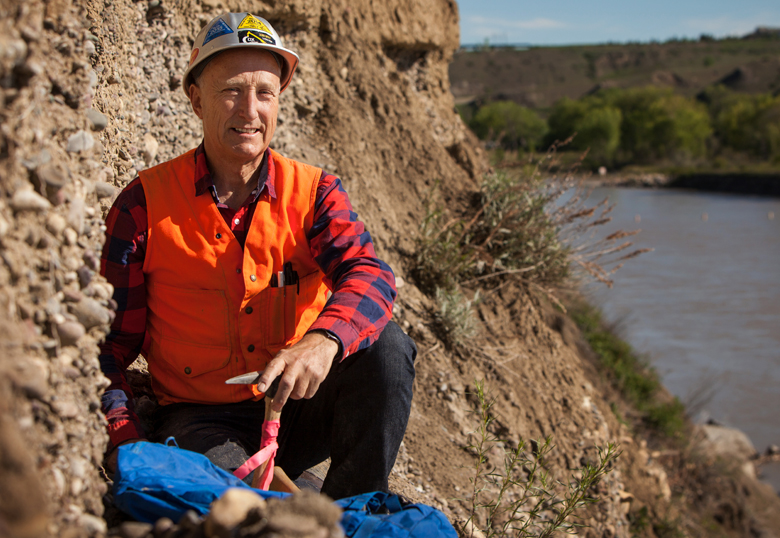Dr. René Barendregt (BSc ’71) will tell you he hasn’t gone all that far in his life, but it’s relative to how “far” is defined.

“I tell my friends and students, I was born right over there in the Galt Hospital, or museum,” he says, pointing from his office window across the Oldman River valley. “Now, I work less than a kilometre from where I was born, so I haven’t gone far in life.”
An esteemed and published researcher, Barendregt is a 35-year member of the Department of Geography who has been around the world studying the natural climate cycling of our planet. In December, he will continue ongoing fieldwork in the Patagonia region of South America. Barendregt has most certainly gone far.
On Thursday, Nov. 23, he spoke as part of the PUBlic Professor Series lectures, presenting to a large community crowd, Global Climate Archives in Mud and Rock: The Magnetic Recorder is Always On (Somewhere)!
Building off the global warming debate, Barendregt’s talk discussed climate change in a historical perspective, maintaining that the current debate over carbon footprints and greenhouse gases must also recognize the historically natural cycles of climate change that have occurred over the last five million years.
“We live in a very dynamic environment on this planet and we should expect change,” says Barendregt. “Sea level will not stay where it is today and if you’re going to build your house one metre above sea level, at some point you may have to move that house. Change is inevitable but there’s no doubt that 7.5 billion people leave a huge footprint and that is added to the natural cycle of climate. It’s important for us to understand the cycling of climate because whatever we contribute, adds to that natural cycle.”
Barendregt grew up on the family farm northeast of Picture Butte. As a Grade 12 student he toured a fledgling U of L campus located on the grounds of Lethbridge College. The next year, he enrolled and began what was initially an interest in becoming a social studies teacher. His interest in both history and geography eventually led to a switch in majors and his career path was established.
“My father said if I don’t go to school, I’m going to be on the shovel all my life, and it turns out I’ve been on the shovel and pick all my life – but as a geologist instead,” he says of his dad, a Dutch immigrant who, before emigrating to Canada, had farmed the same Patagonia region Barendregt now studies, back in the 1930s.
Following the U of L, Barendregt studied at the Technological University of Delft and then Queen’s University. He taught at San Francisco State University for five years until coming back to southern Alberta in 1982 when he was hired on at the U of L.
While Barendregt has worked in a variety of exotic locales, and met people such as Dian Fossey while conducting his studies, the plains of Alberta were not only his original inspiration, they continue to provide a rich resource for his research.
“We think of the Prairies as bald, flat and not interesting and when you drive from Winnipeg to Lethbridge you’ll come across a lot of glacial lake plain, but it’s when you dive down into the valleys, the badlands, the coulees and the slopes of the Sweetgrass hills, you realize what a fascinating history there is here,” he says.
Barendregt is eyeing retirement in the next couple years but it will likely mean only from the classroom. He still has a yen to travel and dig in the dirt throughout the world, unearthing the history it holds and lending a scientific voice to the climate change debate that continues to rage. He sees disturbing trends but is surprisingly not pessimistic.
“Humans are incredibly adaptable and they have been throughout earth history. They’ll have no choice but to adapt to different climates,” he says. “Sea ice cover is diminishing rapidly and maybe in our lifetime we could see summer sea ice as largely gone. We see these changes, they are real, but the big natural cycles set the stage and then we continue to add to it – and that’s not insignificant. The science is the best we can do to try and figure this out. I’ll be the first to admit that we have lots of things to learn about this wonderful planet.”

